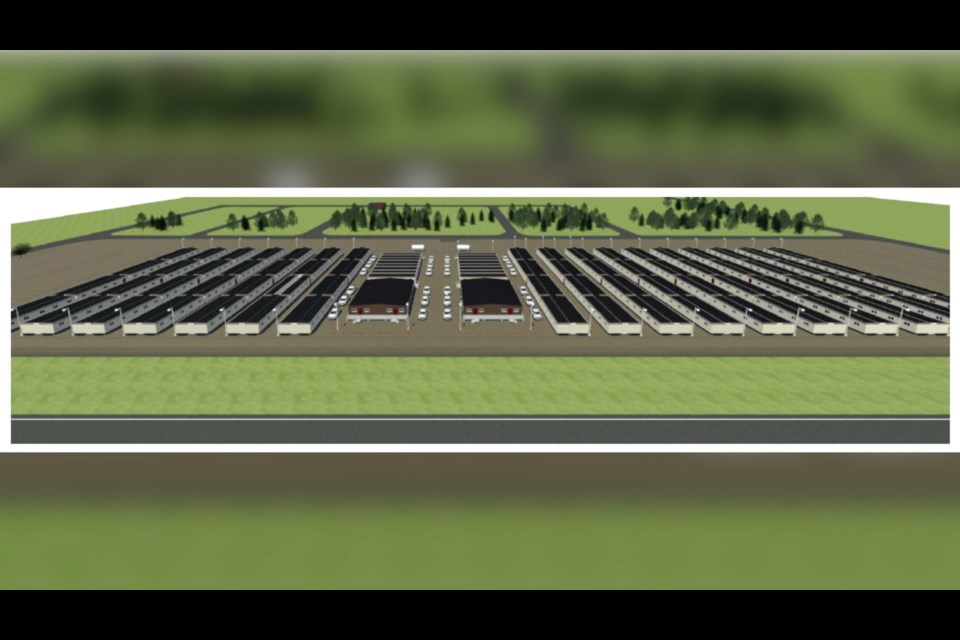"It solves a need that is needed," said Chippewa County Economic Development Corporation (EDC) President Chris Olson.
And that need is housing for the hundreds of people that are currently working on the Soo Locks expansion project and hundreds more that will be in the next seven years when the project is expected to be completed.
Many of the workers are staying at local hotels or campgrounds.
Southeastern Disaster Relief Services (SDRS) will be erecting turn-key, dorm-like apartments on nearly ten acres on M-80 in Kincheloe to ease the housing shortage in the area.
Vice President of Camp Operations for SDRS, Todd Harris, has been in the workforce housing industry for thirty years. He has two key employees living in Sault Ste Marie that approached him about the need for housing.
They made me aware of the Soo Locks project two years ago. Since then, I have been keeping my eye on it. And as it progressed to Phase Three of the project, I came up and made introductions and began looking at the overall project and need for our services in this region," Harris said.
Harris was looking for land in Sault Ste Marie, but there was nothing that would fit the need for a rapid turn-key operation such as his. So he looked outside the city and began working with Olson at the EDC.
"We open things within 60-90 days and Chris here at the Chippewa County EDC was receptive and willing to work with us. This was last year. There was a long delay in the contract, but recently I was contacted by Kokosing Alberici Traylor, the company contracted for the Soo Locks project, to get the housing project initiated," Harris said.
Olson found the perfect property in Kincheloe for the housing development. It is located about 25 minutes from the Soo Locks. A stone's throw from Chippewa County International Airport. A few miles from I-75.
"There is a large need for workforce housing in the region. This really solves this problem. By putting this camp in Kincheloe, it really addresses that need for housing," Olson said.
By the end of June, around 100 rooms will be available. By June 2024, another 100 rooms will be added. Then in 2025 another couple hundred rooms for a total of 400. After that, it depends on the workload at the Soo Locks.
The county and township approved the project in no time at all.
"We worked closely with the township on this. We looked around the county for different locations, but this was the best choice because of the amenities that are needed for this type of structure to be placed," added Olson.
Work on the property started earlier this week. Next week, Harris said the actual structures will be delivered from Canada.
These apartments are more like high-end dorm rooms with 38 rooms in a building. Each will have their own bathroom with one bed. The building will have its own cafeteria with three buffet-style meals served each day. In addition, there will be 24-hour security, transportation to and from the Soo Locks, housekeeping, medical services, recreation area, cable tv and Wi-Fi all included in the rent price.
The rent will be around $3,000 a month.
"We provide everything. It can get as sophisticated as a client wants, or we can trim it back. But in this situation, this housing facility is going to provide all kinds of services," Harris continued.
This housing project will also help out the local economy with jobs.
Harris said they will contract out to local providers such as propane, contractors, food services and more.
"Here at the EDC, we foster employment, and this helps our mission. It brings economic need for this area. We are well in support of this," Olson said.
It will also bring in tax revenue to the area.
This project has not gone without some concern from local residents. Some first thought that the housing project, or camp, was being built for migrants. But those concerns were quickly squashed.
"It's been an education process because people just didn't know what the camp was about, but once they found out it was for the Soo Locks workers, the concerns were gone," Olson said.
Once the Soo Locks Expansion Project is finished in about seven years, SDRS will remove all the buildings and move on to the next area that needs them.
However, the water and electrical will all remain in place so that if a developer wants to build a permanent housing complex on that site, those two services will be all set.



